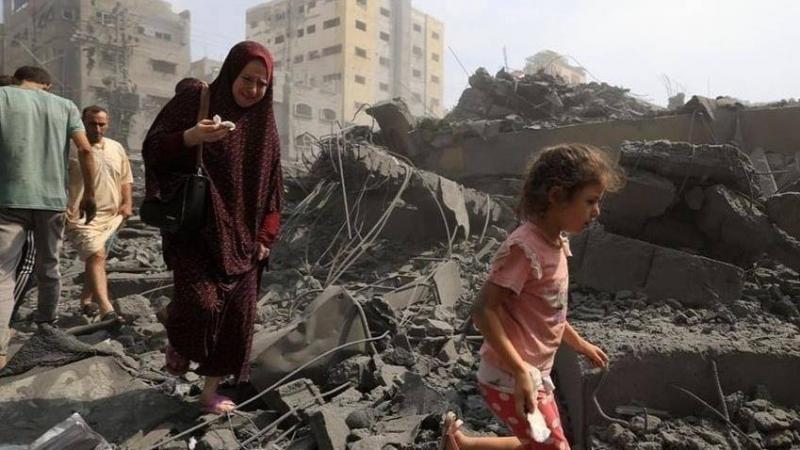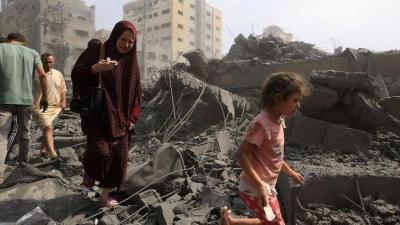The United States believes that the remaining disagreements between Israel and Hamas can be overcome in what has been described as "last chance" negotiations regarding the latest ceasefire proposal put forward by the Palestinian movement, with talks resuming in Cairo today, Wednesday.
This morning, the Israeli army announced the reopening of the Kerem Shalom crossing to allow humanitarian aid into the Gaza Strip. The army stated in a press release that trucks coming from Egypt had already arrived at the crossing, loaded with supplies, including food, water, shelter equipment, medicine, and medical supplies.
Israeli forces seized the main border crossing between Gaza and Egypt in Rafah, southern Gaza, yesterday, where more than one million Palestinians have sought refuge due to the ongoing Israeli assault for the past seven months. This action cuts off a vital route for delivering aid to the small enclave where hundreds of thousands live without shelter and suffer from hunger.
Two Egyptian sources stated that all five delegations participating in the ceasefire talks yesterday, which include representatives from Hamas, Israel, the United States, Egypt, and Qatar, responded positively in Cairo to the resumption of negotiations, which are expected to continue this morning.
An informed source stated that CIA Director William Burns is traveling from Cairo to Israel today, Wednesday, to meet with Israeli Prime Minister Benjamin Netanyahu and other officials.
**Three-Phase Proposal**
Israel rejected on Monday the three-phase proposal that Hamas accepted, claiming it was unacceptable due to lenient terms. White House National Security Council spokesperson John Kirby stated that Hamas submitted a revised proposal, and the new text indicated that the remaining gaps could be "fully bridged." He refrained from providing details about the terms in his statements on Tuesday.
Since the only ceasefire in the conflict so far, which lasted a week in November, efforts for a ceasefire have stalled, with Hamas refusing to release more Israeli hostages without a commitment to a permanent halt to the war and Israel insisting on negotiating only a temporary truce.
Israeli army footage aired yesterday showed tanks moving near the Rafah crossing between Gaza and Egypt, with the Israeli flag raised on the Palestinian side of it. Israel claims that Rafah is the last stronghold of Hamas fighters.
Osama Hamdan, a Hamas leader, warned reporters in Beirut yesterday that "there will be no ceasefire" if the Israeli aggression continues in Rafah. Meanwhile, the Israeli army stated it is carrying out a limited operation in the city to eliminate Hamas fighters and dismantle the infrastructure used by the movement. The military urged civilians, who had already fled from other areas of Gaza earlier in the conflict, to head to an "expanded humanitarian area" about 20 kilometers away.
United Nations Secretary-General Antonio Guterres appealed to both Israel and Hamas to spare no effort in agreeing to a ceasefire, stating, "Without a doubt, any comprehensive assault on Rafah will lead to a humanitarian disaster."
**Crossing Closures**
The United Nations and other international aid agencies stated that the closure of the two crossings leading to southern Gaza, Rafah and the Israel-controlled Kerem Shalom, has effectively blocked external aid to the region, which is left with very minimal supplies. Families are piled up in camps and temporary shelters, suffering from shortages of food, water, medicine, and other essentials.
Sources from the Egyptian Red Crescent indicated that aid shipments had completely halted. The White House stated it had been informed that the Kerem Shalom crossing would reopen today (which has indeed happened), and fuel shipments through Rafah would also resume at that time.
**Draft Proposal**
According to officials from Hamas and an informed source involved in the talks, the proposal approved by Hamas on Monday includes a first phase that announces a ceasefire for six weeks, coupled with the flow of aid to Gaza and the return of 33 Israeli hostages, either alive or deceased, while Israel releases 30 Palestinian children and women held in exchange for each released Israeli hostage.
Critics of the Gaza war have urged U.S. President Joe Biden to pressure Israel to change its approach. According to four sources, the United States, Israel's closest ally and primary weapons supplier, has postponed some arms shipments to Israel for two weeks.




